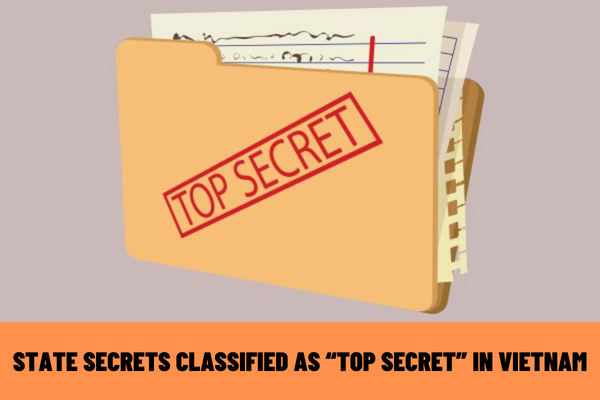Vietnam: What are state secrets classified as “top secret”? Who has the competence in granting permission for duplication and photographing of state secret containers classified as “top secret”?
What are state secrets classified as “top secret”?
Pursuant to Article 8 of the 2018 Law on Protection of State Secrets in Vietnam stipulating as follows:
Classification of state secrets
Based on the importance of their contents and scale of damage in case of divulgence or loss, state secrets are classified into the following 03 levels:
1. State secrets classified as “top secret” are those related to politics, national defense and security, cryptography and foreign affairs whose divulgence or loss can cause exceptionally grave damage to national interest;
2. State secrets classified as “secret” are those related to politics, national defense and security, cryptography, constitution formulation, legislation, judiciary, foreign affairs, economy, resources and the environment, science and technology, education and training, culture, sport, information and communications, healthcare, population, labor and social affairs, organizational structure and official affairs, inspection, supervision, handling of violations, settlement of complaints and denunciations, anti-corruption and state audit whose divulgence or loss can cause extremely grave damage to national interest;
3. State secrets classified as “confidential” are those related to politics, national defense and security, cryptography, constitution formulation, legislation, judiciary, foreign affairs, economy, resources and the environment, science and technology, education and training, culture, sports, information and communications, healthcare, population, labor and social affairs, organizational structure and official affairs, inspection, supervision, handling of violations, settlement of complaints and denunciation, anti-corruption and state audit whose divulgence or loss can cause grave damage to national interest.
According to this regulation, State secrets classified as “top secret” are those related to politics, national defense and security, cryptography and foreign affairs whose divulgence or loss can cause exceptionally grave damage to national interest.

Vietnam: What are state secrets classified as “top secret”? Who has the competence in granting permission for duplication and photographing of state secret containers classified as “top secret”?
Who has the competence in granting permission for duplication and photographing of state secret containers classified as “top secret”?
According to Article 11 of the 2018 Law on Protection of State Secrets in Vietnam, the persons with competence in granting permission for duplication and photographing of state secret containers classified as “top secret” include:
- Heads of central organizations of the Communist Party; heads of affiliates of the Central Steering Committee of the Communist Party;
- Heads of organizations of the National Assembly and affiliates of the Standing Committee of the National Assembly; the Secretary General of the National Assembly - Chief of Office of the National Assembly;
- Chief of Office of the President;
- Chief Justice of the Supreme People’s Court, Chief Prosecutor of the Supreme People’s Procuracy;
- State Auditor General;
- Chief Justices of Superior People’s Courts, Chief Justices of provincial People’s Courts, Chief Prosecutors of Superior People’s Procuracies, and Chief Prosecutors of provincial People’s Procuracies;
- Heads of central bodies of socio-political organizations;
- Ministers and heads of Ministerial-level agencies;
- Heads of Governmental agencies;
- Secretaries of Party Executive Committees of provinces and cities and Head of Delegation of the National Assembly Deputies, Chairpersons of People's Councils, Chairpersons of People's Committees of provinces and central-affiliated cities;
- Superiors of the persons specified in Points a, b, c, h and i Clause 1 Article 11 of the 2018 Law on Protection of State Secrets in Vietnam;
- Heads of Office of the State Audit Office, affiliates of the State Audit Office, specialized State Audit Offices and regional State Audit Offices;
- Heads of affiliates of the bodies specified in Points a, b, c, d, dd, g and h Clause 2 Article 11 of the 2018 Law on Protection of State Secrets in Vietnam, excluding heads of public service providers;
- Heads of overseas representative missions of the Socialist Republic of Vietnam.
In which case is the protection period for state secrets classified as “top secret” extended?
Pursuant to Article 19 of the 2018 Law on Protection of State Secrets in Vietnam stipulating the time period for state secrets protection as follows:
Time period for state secrets protection
1. The time period in which a state secret is protected starts from the date on which its confidentiality level is determined until the expiration of:
a) 30 years, if the state secret is classified as “top secret”;
b) 20 years, if the state secret is classified as “secret”;
c) 10 years, if the state secret is classified as “confidential”.
2. The time period for protection of an operation concerning a state secret may be shorter than prescribed in Clause 1 herein and must be specified in the container of such secret upon determination of the confidentiality level.
3. The protection of a location concerning a state secret shall end when the competent authority or organization stops using such location to store the state secret.
At the same time, Article 20 of the 2018 Law on Protection of State Secrets in Vietnam provides as follows:
Extension of state secrets protection period
1. A state secret may be protected for an extended period of time if the declassification of such secret jeopardizes national interest.
2. The head of the regulatory body or organization that determines the state secret shall decide the extension of its protection period no later than 60 days before the original protection period expires. Each extension shall comply with the duration defined in Clause 1 Article 19 of this Law.
3. After its protection period is extended, the state secret must bear the seal denoting the extension and have the extension notified in writing or via other forms.
4. The regulatory body or organization extending the protection period must notify relevant regulatory bodies, organizations and individuals of such extension no later than 15 days after the extension date.
After receiving the extension notice, relevant regulatory bodies, organizations and individuals shall put the seal denoting the extension on the state secrets under their management and notify the extension in writing or other forms.
Thus, the state secret classified as “top secret” has a protection term of 30 years and will be extended if the declassification of such secret jeopardizes national interest.
LawNet
